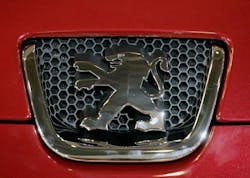Peugeot Plans US Return 30 Years after Exit
Some 30 years after exiting the United States due to plunging sales, Peugeot is preparing a return to a market where it previously knew glory at the famed Indianapolis 500.
PSA Group CEO Carlos Tavares said this week that the Peugeot -- a brand known for its lion logo -- is the parent company's pick for the U.S. market. The company plans to sell Peugeot autos in the US by 2026 in line with a multi-step 10-year plan first announced in 2016.
The comeback is being devised as PSA, which also sells cars under the Citroen and Opel brands, faces pressure from investors to diversify its revenues beyond Europe at a time when US sanctions have torpedoed ambitions in Iran and the Chinese auto market has slowed considerably.
What kind of cars will be sold? What will be the silhouette? Will Peugeot work through existing dealerships, an expensive proposition in some key cities, or sell directly to customers and skip certain markets?
For now, the automaker isn't offering many details.
"We believe we're being frugal," said Larry Dominique, chief executive of PSA North America.
"We believe we're being very careful and making sure that we do this the right way because new brands entering the U.S. and Canadian market does not happen very often."
Auto experts say the ambitious plan will not be easy to execute.
"I think Peugeot will struggle to get back into the U.S. market," said longtime industry consultant Maryann Keller. "It will be expensive and take years."
"No one under the age of 50 recalls seeing a Peugeot on the road," Keller said, adding that 1970s reruns of the schlumpy Peugeot-driving detective "Columbo" are not top of mind anymore.
Saturated Market
Peugeot plans initially to sell vehicles in the U.S. that are imported from China and Europe.
"Yes we understand there are tariff discussions going on right now and so forth," Dominique said. "But the expectation is we will initially import."
Peugeot plans to launch in a single U.S. state and will then ramp up. The company has identified 15 states and four Canadian provinces that are especially receptive to imports.
The company will explore U.S. manufacturing if there are volumes to justify it.
Peugeot faces myriad challenges to be successful in a market that is huge but also already saturated with some 40 brands and looks to be stable at best in overall sales after a series of records earlier in this decade.
U.S. consumers have tilted heavily towards sport utility vehicles, pickups and other large vehicles, which composed around 69 % of the 17.3 million vehicles sold last year.
Peugeot can compete in these markets with models that have sold well in Europe such as the 3008 and 5008 SUVs. But the brand's smaller sedan models, which sell well in Europe, are deeply out of favor in America.
Peugeot also could face tough competition from new entrants, especially China, whose groups such as GAC, Great Wall and Kandi plan to market in the US in the coming years.
Niche Proposition-
Peugeot exited the United States in 1991, having clearly been surpassed by Japanese rivals. In that year, it sold 3,500 vehicles.
Peugeot vehicles triumphed at the Indianapolis 500 three times in the early 20th Century and the brand to this day figures prominently at other races such as the 24 Hours of Le Mans in France.
The cars are tough to find these days in the United States. The collector's website Hemmings.com lists one 1987 505 GLS model for $6,495 in Nebraska.
Back in the day, Peugeot was known for innovative engineering "but only by really car-savvy people -- and mainstream American consumers probably didn't know anything about them," said Ivan Drury of Edmunds.com.
At this point, Peugeot has a "clean slate" in the U.S., Drury said.
Italian brands Fiat and Alfa Romeo have had mixed success since being introduced in the US a few years. Sales of Fiats nosedived 43.8 percent in 2018 to 15,521, while Alfa Romeo's sales dipped 0.6 percent to 23,800.
Karl Brauer of Kelley Blue Book warned that Fiat's performance in the US could be a template for what happens with Peugeot.
Fiat "bailed out at roughly the same time that Peugeot bailed out and then it came back into the market almost a decade ago and it's never really gotten a strong following," Brauer said.
"I think it's going to be a big challenge for them."
But Dominique said Jaguar Land Rover and Subaru were two examples of brands that had succeeded in carving out niche offerings in cars.
"The idea is to focus on customer satisfaction and profitability, not volumes," Dominique said. "When the volume justifies the investment then we will consider industrialization."
Peugeot launched a car-sharing application, Free2Move, in October in Washington DC. The cars for now are General Motors vehicles, but Peugeot is working to have its own models used.
By Luc Olinga
Copyright Agence France-Presse, 2019
About the Author
Agence France-Presse
Copyright Agence France-Presse, 2002-2025. AFP text, photos, graphics and logos shall not be reproduced, published, broadcast, rewritten for broadcast or publication or redistributed directly or indirectly in any medium. AFP shall not be held liable for any delays, inaccuracies, errors or omissions in any AFP content, or for any actions taken in consequence.
